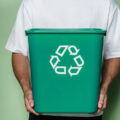One in six couples in the United Kingdom argues about recycling, according to a new study conducted by Every Can Counts. According to the organization, 15% of British couples have had disputes related to recycling, and 32% of them acknowledge that these disagreements occur at least once a week.
The report highlights how a seemingly simple activity can generate conflicts at home. The main causes of arguments include placing waste in the wrong container (40%), leaving empty toilet paper rolls in the bathroom (33%), and not properly rinsing containers before recycling them (30%).
The survey, which consulted a total of 2,000 people in the United Kingdom with the aim of raising awareness about the importance of recycling both inside and outside the home.
The results also show how seriously this issue is taken: 23% of those who have had arguments about recycling claim that these escalated into major fights, and 15% even admit to having gone a day or more without speaking to their partner as a result.
Despite the tensions, 73% of households have an established recycling system and 79% of Britons claim to know the recycling regulations in their area.
When asked why they believe their partner makes mistakes when recycling, 28% responded that they do it on purpose to irritate them, 27% attributed it to laziness, and 23% considered that their partner simply believes their way of doing it is better.
Chris Latham-Warde, manager of the Every Can Counts program, has commented that as a positive aspect, there is already great awareness about it and a commitment to wanting to do it right.
Aluminum, for example, can be recycled infinitely and a can can return to the shelves in just 60 days. That’s why it’s essential to set aside differences and make sure that everyone is doing their bit to protect the planet and keep valuable materials in circulation.
The 10 Most Common Reasons for Recycling Disputes at Home
- Placing waste in the wrong container
- Leaving empty toilet paper rolls in the bathroom
- Not properly rinsing containers before recycling
- Overfilling the organic waste bin without changing the bag
- Leaving dirty utensils or plastic containers for someone else to clean
- Accumulating recycling outside the container instead of inside
- Throwing organic waste in the general trash bin
- Arguing about whose turn it is to take out the recycling
- Not folding cardboard correctly
- Debating whether greasy pizza boxes can be recycled















